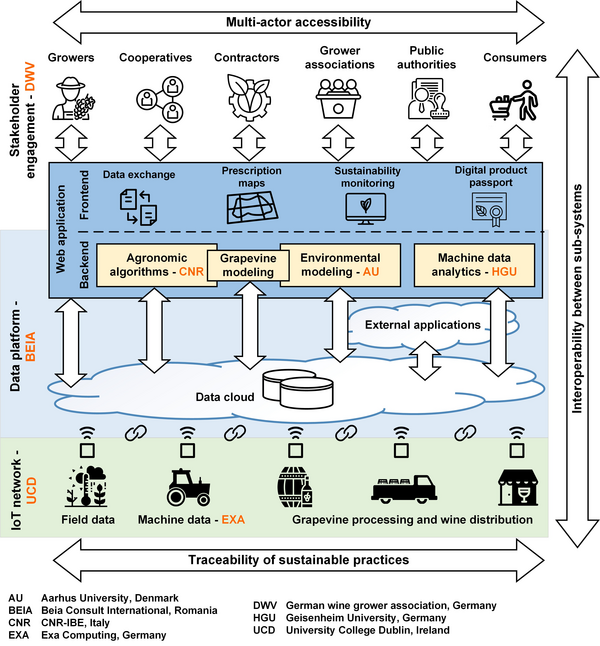The international project network consisting of seven partners from five EU countries coordinated by Prof. Dr. Dimitrios S. Paraforos, Head of the Department of Agricultural Engineering at Hochschule Geisenheim University, aims to develop a holistic digital approach to trace sustainable practices in viticulture in order to promote their widespread implementation.
European winegrowers face increasing competition and significant challenges due to climate change, adding to the number of uncertainties in the wine sector. At the same time, consumers of premium products such as wine are looking for transparent information on the environmental impact of the product. Previous information and communication technology (ICT)-based traceability solutions for the wine value chain have focused primarily on food safety and fraud detection. Carbon and water footprints have been calculated using life cycle assessment approaches, some of which have been very simplistic. So far, little attention has been paid to the environmentally relevant processes in the vineyard, such as the water management, energy and agronomic inputs as well as greenhouse gas fluxes.
The Oenotrace project, funded by the German Federal Ministry of Food and Agriculture (BMEL), aims to use digital tools to trace sustainable practices in the vineyard automatically and with full transparency. To achieve this goal, the first step is to analyze the entire value chain, involving different stakeholders. For a specific application in Germany, an IoT network will be established to track individual steps in the wine value chain. Extensive data collection campaigns will be carried out at experimental sites in Germany and Italy to develop, calibrate and validate agronomic algorithms using grapevine models with the ultimate goal to implement precision viticulture practices. In combination with environmental models, water and greenhouse gas fluxes will be precisely determined at the field level. This information will then be used to derive sustainability indicators for a digital product passport. A machine data analysis pipeline will help quantify the amount of inputs used, such as pesticides and diesel. All data streams and algorithms will be integrated on a data platform to finally provide information on the sustainability of the primary production in a web frontend that can be used by different stakeholders.
From a scientific perspective, Oenotrace will provide new information on the environmental impact of cultivation practices, and help develop new ICT-based tools to help winemakers improve their economic and environmental performance. In addition, the project is expected to meet consumer demand for detailed information on production processes and potentially increase revenues for the wine industry. In the long term, i.e. beyond the scope of the project, the results may lead to new, data-driven incentive/reward systems or more targeted subsidy programs, also for other food value chains. Oenotrace is funded by ERA-NET ICT-AGRI-FOOD with financial support provided by the German Federal Ministry of Food and Agriculture (implementing authority: Federal Office for Agriculture and Food).
Contact: Prof. Dr. Dimitrios S. Paraforos, Professorship for Agricultural Engineering in Special Crop Cultivation
Duration: June 1, 2023 – May 31, 2026
Project partners:
- Hochschule Geisenheim University; Department of Agricultural Engineering (project coordination)
- Aarhus University, Department of Agroecology, Denmark
- Beia Consult International, Romania
- National Research Council of Italy, Institute of Bioeconomy, Italy
- University College Dublin, School of Biosystems and Food Engineering, Ireland
- Exa Computing GmbH, Germany
- Deutscher Weinbauverband e.V., Germany



